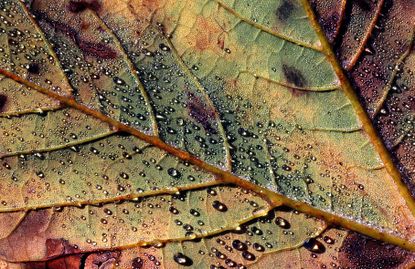How scientists are designing a new material to harness the power of condensation
It's inspired by an insect and two plants


In an old episode of The Voyage of the Mimi, an educational kids' show from the 1980s, a young Ben Affleck hangs a tarp over the top of a bucket of seawater, then collects the drinkable freshwater that condenses on the inside of the tarp. The power of condensation, which spared Ben and his shipmates a slow death on a desert island, is one of humanity's most ancient and ubiquitous technologies. A group of scientists and engineers at Harvard, though, say it can be improved upon — with the help of a new surface design inspired by an insect and two plants.
Condensation, the conversion of a gas to its liquid state, is the basis of a number of inventions — the oldest of them probably being distillation, whereby alcohol and water are separated. Because the two liquids have different evaporation and condensation points, moonshiners can send alcohol alone up through pipes and into a jug. In the mid-1700s, James Watt invented an improved steam engine that relied on a water-cooled condenser. Since then, condensers have been a central part of many heat-transferring technologies, like power generation, refrigeration, and air-conditioning.
The conversion of gas to liquid usually occurs when the temperature and pressure of the gas fall below its boiling point. A surface that is cooler than the surrounding air will collect droplets of condensate. The challenge with controlling condensation, though, is that a surface is usually good at either collecting drops quickly or shedding them quickly, but not both. This tradeoff puts a limit on efficiency, says Dr. Joanna Aizenberg, a professor of chemistry and chemical biology at Harvard: "What can nature tell us about how to improve that?"
Subscribe to The Week
Escape your echo chamber. Get the facts behind the news, plus analysis from multiple perspectives.

Sign up for The Week's Free Newsletters
From our morning news briefing to a weekly Good News Newsletter, get the best of The Week delivered directly to your inbox.
From our morning news briefing to a weekly Good News Newsletter, get the best of The Week delivered directly to your inbox.
Kyoo Chul Park, a mechanical engineer at Aizenberg's lab, thought the Fogstand beetle might offer a novel solution. It lives in southern Africa's Namib Desert, and collects water from morning fog on the tiny bumps on its back. The tips of the waxy bumps are hydrophilic (water-attracting) and the spaces in between are hydrophobic (water-repelling), a pattern that helps the water collect and slide off. The beetle simply tips forward and lets the droplets roll down into its mouth. (The bug is a popular muse: It led one man to invent a new way of watering plant roots, and the hydrophilic/phobic pattern on its back is the inspiration behind Massachusetts-based Namib Beetle Design Nanotechnologies' super non-stick coatings.) Park wondered, though, if the shape of the beetle's bumps was part of what was helping droplets collect. "The previous understanding is by chemistry, not topography," he says.
Park started his study, published this month in Nature, by using a 3D printer to create an aluminum plate covered with millimeter-high bumps arranged in a staggered pattern, like the holes on a cheese grater. He stood this plate alongside a flat plate in a temperature- and humidity-controlled chamber, then ran tubes of chilled liquid along the back of both plates to cool them below air temperature. Compared to the flat plate, he found, the bumpy plate collected water droplets much faster. Clearly, topography mattered. But the bumps didn't shed the droplets well; there was still a tradeoff between collecting and shedding the drops.
Next, Park looked to cactus spines, which draw water back toward the cactus through capillary action (the ability of liquids to flow in narrow spaces without the help of, or even against, gravity). He devised another bumpy aluminum surface, this time shaping each bump so that it was rounded on one side and flattened into a down-angled ramp on the other — even more like the holes on a cheese grater. With this set-up, the water droplets collected on the rounded part of the bump and then slid down the wider, flattened end.
Finally, Park covered the bumps in a water-shedding coating called SLIPS (for Slippery Liquid-Infused Porous Surfaces), invented at the Aizenberg lab. The coating was inspired by the waxy substance on the inside of pitcher plants, which sends flies tumbling into the plants' digestive reservoirs. Aizenberg says pitcher plants' nonstick coating is similar to the architecture that allows our eyes to slide freely in their sockets, food to slide freely through our guts, and fish to slide through the ocean — a rough surface covered with a thin layer of liquid (mucus, in all aforementioned examples) that serves as a lubricant. "This idea of a liquid interface is a very common feature in nature," she says.
Sign up for Today's Best Articles in your inbox
A free daily email with the biggest news stories of the day – and the best features from TheWeek.com
After a hit of the non-stick coating, Park's condensing surface was able to overcome the usual tradeoff between collecting and shedding droplets. In tests, the surface — "slippery asymmetrical bumps," as he calls the texture — collected and shed an order of magnitude more water than a similar flat surface within a short time.
During his research, Park also found that a tightly curved surface collected more water than a flat surface, even, surprisingly, at higher temperatures. It's further evidence of his hypothesis, that where condensation is concerned, "topography is one of the important factors," he says.
Although his slippery asymmetrical bumps performed well in the settings of the test, Park says they could be adjusted for optimal performance in a wide array of applications, from steam power generation to air-conditioning, where efficiency depends on quickly condensing and recirculating water. They might be tweaked to build a still that's more efficient at collecting alcohol — or even a special tarp for collecting water on desert islands.
Editor's note: This article originally slightly misstated how much more water Park's condensing surface collected and shed vs. a similar flat surface. It has since been corrected. We regret the error.
Create an account with the same email registered to your subscription to unlock access.
-
 Today's political cartoons - April 21, 2024
Today's political cartoons - April 21, 2024Cartoons Sunday's cartoons - devilish decrees, biblical blunders, and more
By The Week US Published
-
 5 carefully selected cartoons about the Trump-Daniels jury selection process
5 carefully selected cartoons about the Trump-Daniels jury selection processCartoons Artists take on a stress-free life, rare peers, and more
By The Week US Published
-
 Loire Valley Lodges review: sleep, feast and revive in treetop luxury
Loire Valley Lodges review: sleep, feast and revive in treetop luxuryThe Week Recommends Forest hideaway offers chance to relax and reset in Michelin key-winning comfort
By Julia O'Driscoll, The Week UK Published